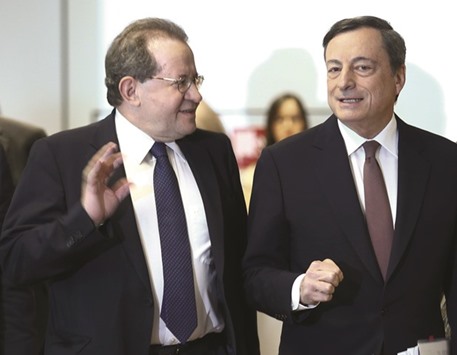The European Central Bank held its key interest rates steady yesterday, but analysts believe it could pave the way for new stimulus measures soon, despite growing resistance in Germany.
The ECB’s governing council voted, as expected, to keep the benchmark “refi” refinancing rate at its current all-time low of zero per cent, after cutting it to that level in March, an ECB spokesman said.
At the same time, the ECB also held the rate on its marginal lending facility unchanged at 0.25% and the rate on the deposit facility steady at minus 0.40%.
At its previous meeting on March 10, the ECB had announced a new range of new policy moves aimed at pushing chronically weak inflation in the euro area back up to economically healthier levels.
These included cutting interest rates, beefing up its controversial asset purchase programme known as quantitative easing and making vast amounts of cheap loans available to banks.
And analysts said the central bank would be watching closely how the effects of those moves were mapping out in the eurozone economy.
ECB president Mario Draghi was scheduled to comment on the reasoning behind the latest monetary policy decisions at a news conference later.
Analysts said they expected him to stress that further action could still be on the cards further on down the line, even in the face of increasing criticism of ECB policies in Germany.
“Germany is the ECB’s main problem at the moment,” a source close to the central bank told AFP.
German Finance Minister Wolfgang Schaeuble has been unusually frank about his displeasure over zero interest rates, suggesting they were helping foment political unrest in Germany and aiding the rise of an anti-euro, anti-immigrant party, the AfD.
German criticism of the ECB is extremely rare and has clearly rankled the Frankfurt-based bank.
Schaeuble and Draghi apparently cleared the air on the sidelines of last week’s meeting of the International Monetary Fund in Washington.
Nevertheless, “no matter how much public backtracking there will be, the genie is out of the bottle and Schaeuble has ‘legalised’ ECB bashing in Germany,” Carsten Brzeski, economist at ING DiBa, said.
“The war of words will not be over.”
In the past, the ECB has always reacted archly to any perceived attempts by politicians to meddle in its decision-making processes.
But when tackling Schaeuble’s criticism, Draghi will also have to bear in mind that he still needs to make additional action further down the line – which for most ECB watchers is more or less inevitable – palatable, experts said.
“We expect a strong, open-hearted defence of ECB policies” and on central bank independence, said UniCredit analyst Marco Valli.
Even Germany’s Bundesbank chief Jens Weidmann, who has often been at loggerheads himself with Draghi over the ECB’s response to the threat of deflation, felt moved to rebuke Schaeuble’s attempted interference.
“An expansionary monetary policy stance is appropriate at this juncture regardless of different views about specific measures,” Weidmann said.
According to the latest official data, eurozone inflation stood at zero per cent in March, a long way off the 2% seen by the ECB as compatible with healthy economic growth.
Commerzbank economist Michael Schubert said an initial assessment of the measures announced by the ECB in March was “rather sobering”.
The confidence boost that the central bank had hoped for has not materialised, said the banker. Hence, “the longer the disappointing reaction lasts, the more likely it is that the central bank will take further steps,” Schubert said.
“It will probably opt for the same instruments it has used so far and this will hardly increase confidence significantly.”
UniCredit’s Valli said that “for the time being, the ECB’s focus remains squarely on implementing the several measures already announced”.
Important details are still lacking, for example, about the corporate asset purchase programme which the ECB unveiled last month.
“Regarding non-standard monetary policy measures, we have started to expand our monthly purchases under the asset purchase programme to €80bn,” ($90bn), an ECB spokeswoman said.

European Central Bank president Mario Draghi, right, and vice president Vitor Constancio arrive for a news conference at its headquarters in Frankfurt. The ECB held the rate on marginal lending facility unchanged at 0.25% and the rate on the deposit facility steady at minus 0.40% yesterday.
